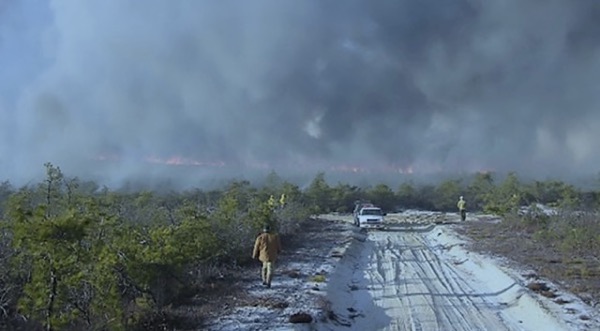No Action 5 Years After Commission’s Workplan First Included Climate Policy
The Pinelands Commission Is Collapsing

The following is the US Military’s caption:
Controlled burns help prevent wildfires, which reduce visibility for air exercises. Photo credit: Dr. Walter Bien, Laboratory of Pinelands Research
The Pinelands National reserve is under attack from many quarters. And as these attacks escalate and proliferate, the Pinelands Commission is literally collapsing.
Most recently, Gov. Murphy failed to secure Senate confirmation of his Pinelands Commission nominees and tomorrow the Commission again will consider a fatally flawed Trojan horse Resolution on the South Jersey Gas pipeline (see also:
Even worse, although you wouldn’t know it from reading today’s NJ Spotlight story on climate risks and impacts in the Pinelands – including wildfire risks – aside from two briefings by climate scientists, the Pinelands Commission is doing virtually nothing to amend the Comprehensive Management Plan (CMP) to adopt enforceable polices and plans to address climate change.
Once again, NJ Spotlight’s coverage got spun by the “experts”, who – in the wake of California and Australia wildfire disasters – opportunistically are promoting a narrative that generates public support and funding for highly questionable policies, such as “controlled burns”, while masking major failure to address serious climate concerns.
Here’s what the “experts” don’t want you to know and that NJ Spotlight again failed to report.
Over 5 years ago, the Pinelands Commission, in The Fourth Progress Report on Plan Implementation (September 2014), first directed staff to develop climate policies and amend the Comprehensive Management Plan (CMP) to address climate risks and impacts. (see Action Plan Table on p. 166):
The Commission will evaluate what options are available to address climate change through the CMP and in cooperation with other agencies.
Since then, aside from 2 scientific briefings on climate science, the Commission has done nothing to amend the CMP to provide enforceable policies and plans that reflect climate science and address climate impacts and risks to the precious natural resources of the Pinelands.
In fact, there is evidence that Executive Director Wittenberg is dragging her feet, if not outright derailing such developments, see:
There are many things the Pinelands Commission could do to address climate change, including:
1) establish and fund phenology, forest management, climate impact science, and monitoring programs, including incorporating climate driven rainfall/drought into their similarly long delayed and seemingly stalled “Kirkwood-Cohansey” project on restricting water allocation to protect ecological functions and ecosystems;
2) mandate and promote energy conservation, energy efficiency, renewables (including installation of EV charging stations, public transport, bicycles, and zero carbon development), and distributed publicly owned local power, micro-grids, etc – including requirements for new development applications and to retrofit of existing development;
3) prohibit new fossil infrastructure, like pipelines and power plants, and phase out existing fossil infrastructure, including ecological restoration of disturbance associated with that infrastructure;
4) regulate greenhouse gas emissions, including mandatory offset and mitigation requirements and net zero development;
5) establish a pro-active adaptation program (not just reactive fire suppression).
Call it a Green New Deal for the Pinelands!
Because Spotlight reported so favorably on how the “experts” spin their wildfire suppression efforts, readers also should know that the military starts forest fires (in their own words: “one fire every 10 – 14 days”) during training exercises.
As we recently wrote, via the REPI program, the Pentagon is funding the NJ “controlled burn” program. For documentation of all that, see:
We wrote to Spotlight reporter Jon Hurdle to provide all these facts that expose serious gaps in his reporting.
Spotlight needs to up their game – they are seriously misleading readers and routinely providing only part of the story.
PS – Virtually the same criticism, failure and missed opportunities apply to the work of the Highlands Council and the Regional Master Plan (RMP). In fact, the problems are even worse in the Highlands, as NJ DEP and NJ Audubon team up to log Highlands forests, under the sham pretext of healthy forests and habitat creation.
These problems will get much worse as about $10 million/year in RGGI “carbon sequestration” funding drives even more destructive logging projects, see:

Pingback: WolfeNotes.com » The Pinelands Commission Finally Takes A First Baby Step On Climate Policy
Pingback: WolfeNotes.com » Murphy DEP Finds Another Bright Shining Object To Deflect Attention From Gov. Murphy’s Climate Collapse